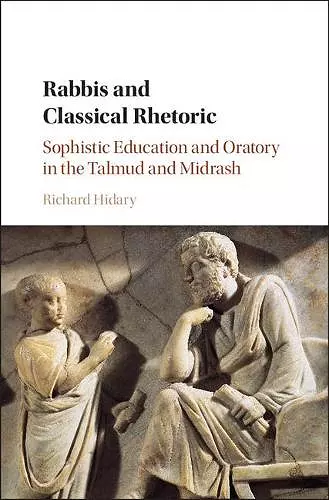Rabbis and Classical Rhetoric
Sophistic Education and Oratory in the Talmud and Midrash
Format:Hardback
Publisher:Cambridge University Press
Published:21st Dec '17
Currently unavailable, and unfortunately no date known when it will be back
This hardback is available in another edition too:
- Paperback£32.00(9781316628355)

Shows the unique perspective of Talmudic rabbis as they navigate between platonic objective truth and the realm of rhetorical argumentation.
Training in rhetoric formed the basis of education in the Roman Empire, even as philosophers like Plato derided it as worthless trickery. The Talmudic rabbis, as a minority in the Greek East, chart a novel approach through this dialectic that engages Greco-Roman rhetoric to recreate the pristine Sinaitic prophetic experience.Training in rhetoric - the art of persuasion - formed the basis of education in the Roman Empire. The classical intellectual world centered around the debate between philosophers, who boasted knowledge of objective reality, and sophists, who could debate both sides of any issue and who attracted large audiences and paying students. The roles of the Talmudic rabbis as public orators, teachers, and jurists, parallel that of Roman orators. Rabbinic literature adopted and adapted various aspects of the classical rhetorical tradition, as is demonstrated in the Talmudic penchant for arguing both sides of hypothetical cases, the midrashic hermeneutical methods, and the structure of synagogue sermons. At the same time, the rabbis also resisted the extreme epistemological relativism of rhetoric as is evident in their restraint on theoretical argumentation, their depiction of rabbinic and divine court procedure, and their commitment to the biblical prophetic tradition. Richard Hidary demonstrates how rabbis succeeded in navigating a novel path between platonic truth and rhetorical relativism.
'In this brilliant and lucid exploration of the impact of classical rhetoric on Talmudic literature, Richard Hidary shows how the ancient Jewish rabbis positioned themselves between Plato and the sophists, between philosophy and rhetoric, between truth and subjectivity. An innovative and nuanced elucidation of rabbinic epistemology and ontology, this volume opens new vistas on the study of ancient Judaism in its late antique Mediterranean context.' Christine Hayes, author of What's Divine about Divine Law: Early Perspectives
'Richard Hidary's examination of the nature and origin of the Talmud's unceasing and inimitable dialogue is a carefully wrought and balanced presentation of the case for seeking the origin of the unique character of both the Babylonian Talmud, and its counterpart in Roman Palestine, in the rhetorical structure of the building block of both talmuds: the sugya, which is essentially an essay in dialogue form, made up of a concatenation of arguments and counter-arguments, which, in the case of the Babylonian Talmud, often culminates in a culmination but not a resolution. Building on previous work on the Graeco-Roman sources of the Talmud's structure and nature, Hidary's monograph nevertheless breaks new ground and provides many fresh insights even for those - like myself - who have studied it since childhood.' Yaakov Elman, Herbert S. and Naomi Denenberg Professor of Talmudic Studies, Yeshiva University, New York
'This is a very important book that not too many scholars are capable of writing. Hidary brings wide and deep talmudic erudition together with an impressive command of classical sources to advance our understanding of rabbinic literature in the context of Graeco-Roman learning and culture.' Daniel Boyarin, University of California, Berkeley
'In his erudite and fascinating exposition of the breadth of the presence of Greco-Roman schools of rhetoric in Midrashic and Talmudic texts, Hidary made a wonderful contribution to our understanding of the relationship between the Rabbinic world and Hellenistic culture. In avoiding simplistic forms of parallelism, Hidary's meticulous philological and historical study illuminates brilliantly the deepest questions of revelation, truth and interpretation that were at stake in this momentous cultural encounter.' Moshe Halbertal, New York University
'… a piece of fine scholarship. ' Eric Ottenheijm, Journal for the Study of Judaism
ISBN: 9781107177406
Dimensions: 235mm x 158mm x 22mm
Weight: 620g
344 pages